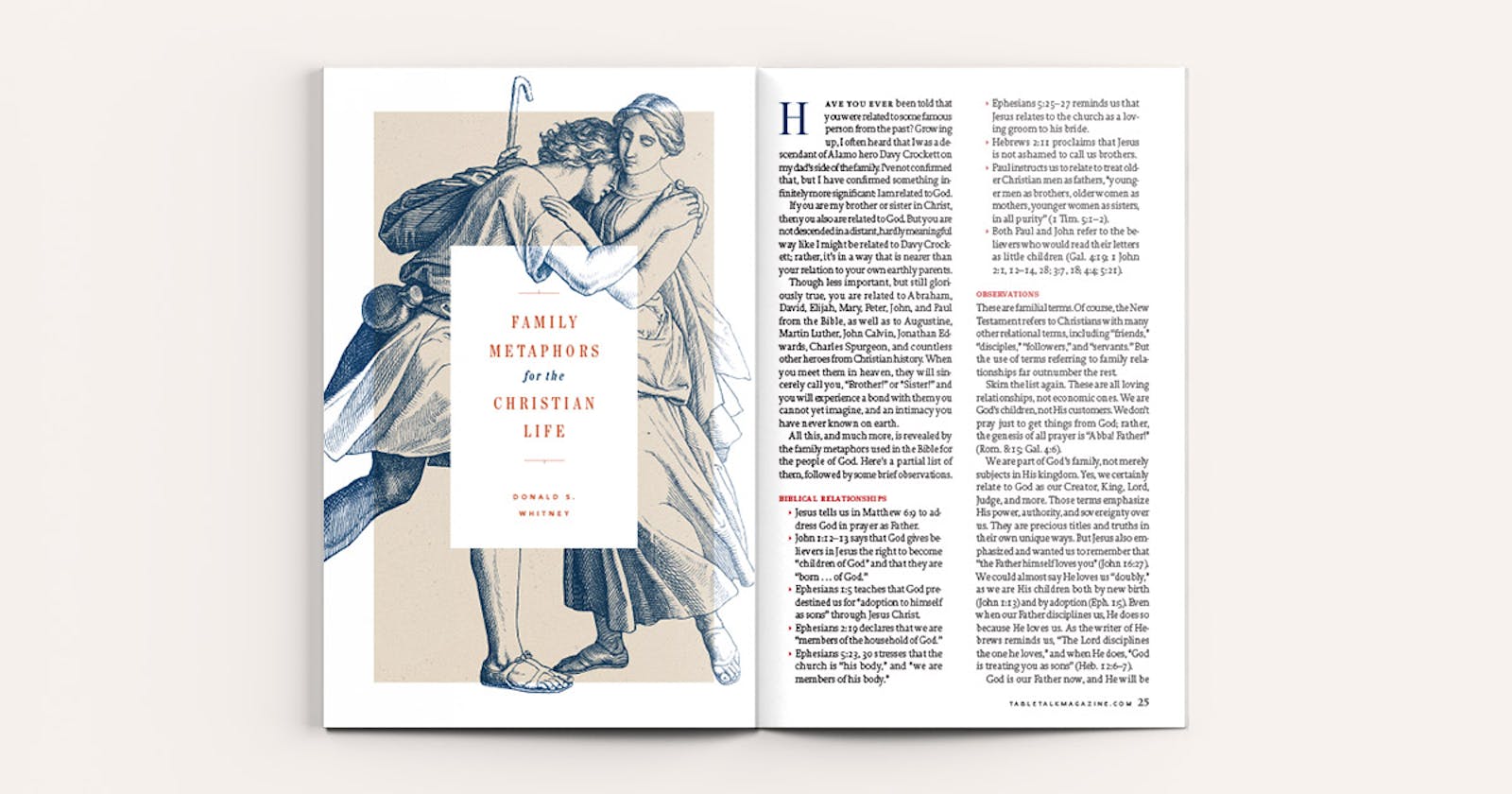
Request your free, three-month trial to Tabletalk magazine. You’ll receive the print issue monthly and gain immediate digital access to decades of archives. This trial is risk-free. No credit card required.
Try Tabletalk NowAlready receive Tabletalk magazine every month?
Verify your email address to gain unlimited access.
Have you ever been told that you were related to some famous person from the past? Growing up, I often heard that I was a descendant of Alamo hero Davy Crockett on my dad’s side of the family. I’ve not confirmed that, but I have confirmed something infinitely more significant: I am related to God.
If you are my brother or sister in Christ, then you also are related to God. But you are not descended in a distant, hardly meaningful way like I might be related to Davy Crockett; rather, it’s in a way that is nearer than your relation to your own earthly parents.
Though less important, but still gloriously true, you are related to Abraham, David, Elijah, Mary, Peter, John, and Paul from the Bible, as well as to Augustine, Martin Luther, John Calvin, Jonathan Edwards, Charles Spurgeon, and countless other heroes from Christian history. When you meet them in heaven, they will sincerely call you, “Brother!” or “Sister!” and you will experience a bond with them you cannot yet imagine, and an intimacy you have never known on earth.
All this, and much more, is revealed by the family metaphors used in the Bible for the people of God. Here’s a partial list of them, followed by some brief observations.
Biblical Relationships
- Jesus tells us in Matthew 6:9 to address God in prayer as Father.
- John 1:12–13 says that God gives believers in Jesus the right to become “children of God” and that they are “born . . . of God.”
- Ephesians 1:5 teaches that God predestined us for “adoption to himself as sons” through Jesus Christ.
- Ephesians 2:19 declares that we are “members of the household of God.”
- Ephesians 5:23, 30 stresses that the church is “his body,” and “we are members of his body.”
- Ephesians 5:25–27 reminds us that Jesus relates to the church as a loving groom to his bride.
- Hebrews 2:11 proclaims that Jesus is not ashamed to call us brothers.
- Paul instructs us to relate to treat older Christian men as fathers, “younger men as brothers, older women as mothers, younger women as sisters, in all purity” (1 Tim. 5:1–2).
- Both Paul and John refer to the believers who would read their letters as little children (Gal. 4:19; 1 John 2:1, 12–14, 28; 3:7, 18; 4:4; 5:21).
Observations
These are familial terms. Of course, the New Testament refers to Christians with many other relational terms, including “friends,” “disciples,” “followers,” and “servants.” But the use of terms referring to family relationships far outnumber the rest.
Skim the list again. These are all loving relationships, not economic ones. We are God’s children, not His customers. We don’t pray just to get things from God; rather, the genesis of all prayer is “Abba! Father!” (Rom. 8:15; Gal. 4:6).
We are part of God’s family, not merely subjects in His kingdom. Yes, we certainly relate to God as our Creator, King, Lord, Judge, and more. Those terms emphasize His power, authority, and sovereignty over us. They are precious titles and truths in their own unique ways. But Jesus also emphasized and wanted us to remember that “the Father himself loves you” (John 16:27). We could almost say He loves us “doubly,” as we are His children both by new birth (John 1:13) and by adoption (Eph. 1:5). Even when our Father disciplines us, He does so because He loves us. As the writer of Hebrews reminds us, “The Lord disciplines the one he loves,” and when He does, “God is treating you as sons” (Heb. 12:6–7).

God is our Father now, and He will be forever when we live with Him in our “Father’s house” (John 14:2). After we arrive there, we will rejoice in an eternal family. Have you ever seen on the news the reunion of siblings who were separated by war or tragedy and who’ve not seen each other in fifty years, thinking the other was dead? The loving embraces and tears of joy are beautiful to behold. Christian, soon and for all eternity you will see smiling faces running to embrace you, shouting, “Brother!” or “Sister!”
These are terms of intimacy. Those running to embrace you will indeed be your brothers and sisters, closer than anyone you have known in this world. Note that all these terms relate to the nuclear family. There’s no mention in the Bible of aunts, uncles, or cousins in our relationships to God or to His people. You may have relatives greeting you in heaven, but there they—and even your earthly father, mother, or spouse, if they are there—will greet you as “Brother!” or “Sister!”
Have you realized that no relationship you enjoy on earth, no matter how long or how intimate, will compare to the nearness, dearness, and closeness you will feel with every person in heaven? This will occur because of the work of the Holy Spirit and the yet-unimaginable changes to every part of our being. In fact, even now the Spirit has bonded us with other believers in a way that is deeper than with our earthly family. Because of this, and in a way compatible with all the biblical commands about how we’re to relate to our earthly family, our first and highest loyalties are to the family of God.
These are ideal terms. By that I mean that these terms refer to relationships as they should be, without any of the negative associations they may have in this world. On earth we may endure a cruel father, sibling rivalry, or an unfaithful spouse. And because of these experiences, some may struggle to think biblically of God as their Father, of fellow Christians as their brothers and sisters in Christ, and of Christ as their bridegroom. Scripture acknowledges that sin sullies every relationship—even the most loving Christian ones—on this side of heaven. Nevertheless, we are called to pursue purity and holiness (the ideal) in all of them (see 1 Tim. 5:1–2).
Already the reality is that God is a perfect Father and Jesus a perfect Brother. One day, together with all believers, we will be made for Christ a perfect bride, “holy and without blemish” (Eph. 5:27). On that day, every relationship with every other person in heaven will indeed be perfect, occurring in what Jonathan Edwards called “a world of love.”
All these terms are your spiritual birthright, Christian. Use them, and rejoice in them.
